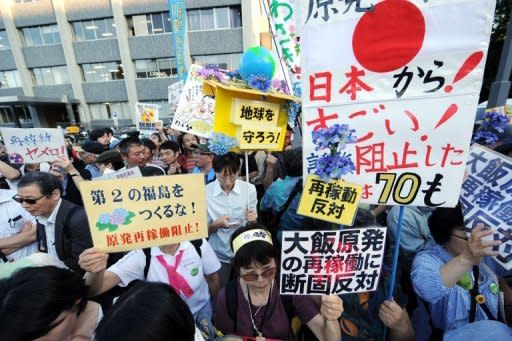Tens of thousands protest Japan nuclear restart
Tens of thousands of people rallied outside the Japanese prime minister's residence in Tokyo Friday in one of the largest demonstrations held against the restart of nuclear reactors. The protesters, carrying placards which read "Rise up against the restart" and "The nuclear era is over," lined the streets around Prime Minister Yoshihiko Noda's residence in central Tokyo as police watched on, according to an AFP photographer. The main entrance to the residence was seen guarded by armoured vehicles and barricades of uniformed police. Organisers quoted in local media estimated turnout exceeded 100,000 people, over double the turnout they estimated at a similar protest last week. Lawmaker Yoshisu Arita, however, placed the figure at closer to 20,000 on Twitter. On June 16, Noda gave the green light to start work to restart two reactors at the Oi plant in western Japan, despite public mistrust in the technology following last year's meltdowns at Fukushima. The demonstration had been called by liberal writers Takashi Hirose and Satoshi Kamata in an online message which spread on Twitter and Facebook in what was likened by a popular tabloid to the "Arab Spring," a wave of protests that topped governments in the Arab world last year. "Down with the Noda government," read a sign held by a protester. A similar protest outside Noda's home last week saw a turnout of 45,000, according to organisers, though the media issued a more conservative figure of 20,000. Smaller scale protests had been held every Friday outside the premier's residence since late March, and have been led in part by Nobel Prize-winning author Kenzaburo Oe, who started an anti-nuclear petition that has so far gathered more than 7.5 million signatures. Japan had been left without nuclear power since early May when the last of its 50 working reactors was shut down. Authorities took the decision to restart the two reactors as they seek to head off a summer power crunch. Radiation was spread over homes and farmland in a large swathe of Japan's northeast when a 9.0-magnitude earthquake and ensuing tsunami in March last year crippled the cooling system of the Fukushima Daiichi plant. No one is officially recorded as having died as a direct result of the meltdowns, but tens of thousands of people were evacuated and many remain so, with warnings some areas will be uninhabitable for decades.



